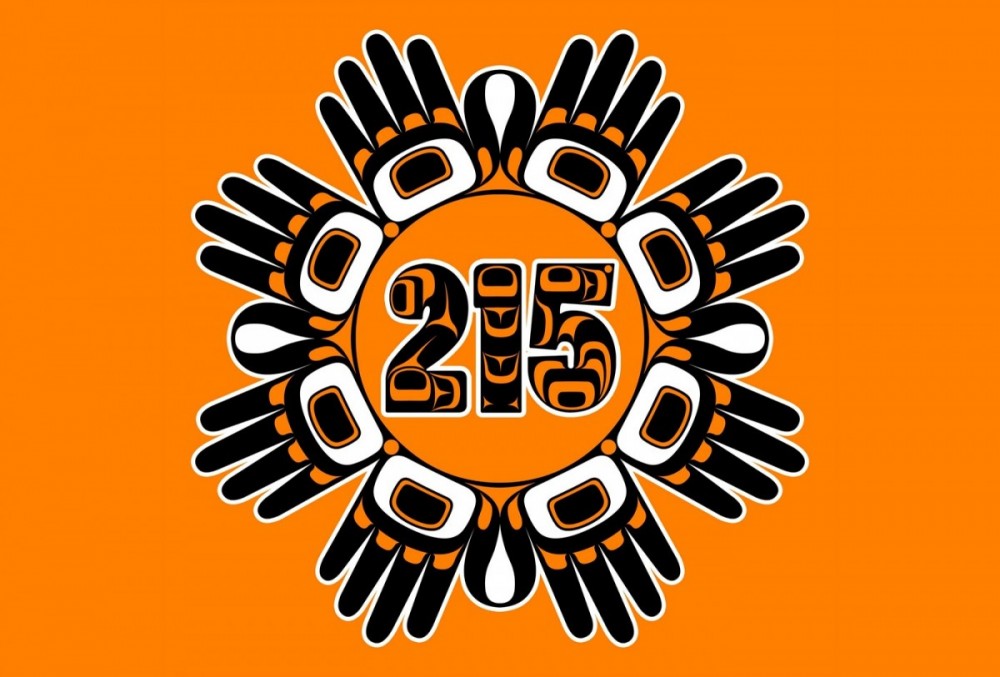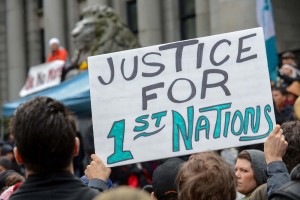Recently we learned that 215 murdered Indigenous children were located in a mass grave at the Kamloops Indian Residential School.
As written in The Final Report of the Truth & Reconciliation Commission of Canada, Canada’s Residential Schools: Missing Children & Unmarked Burials (Vol. 4, page 134):
“Many, if not most, of the several thousand children who died in residential schools are likely to be buried in unmarked and untended graves. Subjected to institutionalized child neglect in life, they have been dishonoured in death. Many Aboriginal people have unanswered questions about what happened to their children or relatives while they were attending residential school. The work that the Commission has commenced in identifying and commemorating those students who died at school and their gravesites needs to be completed.”
The revelation of 215 murdered Indigenous children is not shocking. Not only have the Tk’emlúps te Secwépemc Nation known about this for some time, so have Indigenous communities across Turtle Island, because of Church- and State-sanctioned genocide. Violence, abuse and neglect were rampant at residential schools and experienced by ALL Indigenous Peoples.
The violence continues to this day, affecting Indigenous children in foster care, surveillance and over-policing in the education system, patients discriminated against in the health system, and the continued resource extraction and environmental degradation by non-Indigenous entities on unceded and occupied territories. Indigenous communities have known these truths, and now we know them.
It is our responsibility to examine the function of education in the formation of the Canadian State. All school district staff must reckon with our collective history, in order to establish safe and inclusive classrooms for ALL children. The only way to do this is to implement anti-oppressive pedagogy in our school system, with a particular focus on anti-colonialism and anti-Indigenous racism.
Most school district staff in BC are the product of an education system that did not truthfully teach about the Indigenous peoples of Canada. The Honourable Justice Murray Sinclair, Chair of the TRC has stated “Education got us into this mess and education will get us out of it.”
Three important resources for this learning are:
• Calls to Action by the Truth and Reconciliation Commission (TRC) of Canada
• United Nations Declaration on the Rights of Indigenous Peoples (UNDRIP)
• Draft Principles that Guide the Province of British Columbia’s Relationship with Indigenous People
It is integral that the BC government and Ministry of Education implement TRC Calls to Action No. 57 in the following school year:
“We call upon federal, provincial, territorial, and municipal governments to provide education to public servants on the history of Aboriginal peoples, including the history and legacy of residential schools, the United Nations Declaration on the Rights of Indigenous Peoples, Treaties and Aboriginal rights, Indigenous law, and Aboriginal-Crown relations. This will require skill-based training in intercultural competency, conflict resolution, human rights, and anti-racism.”
The government of Canada and BC have committed to put in practice the TRC Calls to Action and the principles of UNDRIP. As educators, we must evaluate our teaching with the goals of reconciliation. We call on our government to enact the promises they made in ways that are not performative. It is the duty and obligation of educators to intervene when children and youth are in danger or harmed.
Because we cannot travel to the past, we must intervene for the future. Therefore, the Anti-Oppression Educators Collective (AOEC) calls on the Ministry of Education to mandate two days of in-service training for all K-12 school district staff in the 2021-2022 school year to carry out the following work:
1. Read the TRC and UNDRIP in their entirety. (Read.)
2. Debrief in collective groups. (Learn.)
3. Establish goals and action plans to implement all calls to action. (Reckon.)
It is imperative that settlers in the BC education system read, learn and reckon. The TRC report and UNDRIP are very accessible documents. There is no excuse for not reading both documents in their entirety. This learning cannot be deemed voluntary any longer. It must be implemented by the government in order for the K-12 educational system to have a modicum of safety for Indigenous students and staff. This work is for settlers in the education system and not to be done by our Indigenous colleagues. For far too long Indigenous communities have carried the burden of settler education.
It is not by chance that the 215 children finally see the light of the day. It is our responsibility as educational leaders to honour these 215 lives, and the countless others we will never know. We honour them by providing an education system that acknowledges the past, and we do this by holding ourselves responsible. Silence is complicity, inaction is complicity, performance is complicity. We have a moral and ethical responsibility on unceded and occupied territory to accept and start with the truth.
Shanee Prasad is president of Provincial Specialist Associations (PSA) in the BC Teachers Federation (BCTF). She wrote this letter on behalf of the Anti-Oppression Educators Collective (AOEC). Please consider signing AOEC’s petition calling for mandatory training in TRC and UNDRIP for all K-12 school staff in BC.












